A Novel Process for the Production of Biofuels Allowing for Net Negative CO2 Emissions
While notable advances towards
a de-carbonization of the energy
sector have been achieved in recent
years, closing the carbon cycle
of the transport sector, which is
responsible for almost one quarter
of the European GHGE emissions2
and consumes 36% of the global
final energy1, still signifies a key
challenge on the way towards a
carbon-neutral society. A major
hurdle standing in the way of this goal
is the substitution of fossil fuels in
heavy freight transport and aviation
industry, where electrification is
currently not a viable option. In light
of current policies and strategies
related to climate protection and
energy transition, implemented in
order to further promote carbonneutral
transport, novel, sustainable,
and yet competitive technologies are
urgently needed.
One auspicious pathway to reduce
greenhouse gas emissions of the
transport sector is the large-scale
roll-out of so-called 2nd generation
biofuels, which are produced from
bio-based residue materials. By
focusing on biological non-foodgrade
precursors, this approach
contributes not only to a sustainable
shifting from fossil to renewable
resources, but also facilitates the
large-scale economic production of
biofuels, without detrimental effects
on food availability and prices arising.
Yet, one key issue generally related
to 2nd generation biofuels is their high
production cost, which make them
uncompetitive in the current fossil
fuel governed market environment.
To alleviate this problem, an efficient
technology for the production of
liquid fuels based on chemical
looping gasification (CLG) of biogenic
residues is being developed within
the scope of the EU-funded Horizon
2020 project CLARA3, executed by
thirteen international members
including universities, research
institutes, and industry partners. The
combination of CLG, which does not
rely on costly air separation, with
other novel technologies related
to biomass pre-treatment and gas
cleaning yields a process chain,
allowing for major reductions in
biofuel production costs, so that
final end-product prices as low as
0.7 €/l can be realized. Moreover, the
suggested process chain facilitates
net negative CO2 emissions, as
carbon of biogenic origin can be
captured effi ciently within the
process, before being sequestered
(CCS) or utilized (CCU).

These aspects, in combination
with projected advances in terms
of process scalability, make the
suggested process chain an
auspicious carbon-negative value
chain, promising an efficient decarbonization
of the transport sector,
while at the same time guaranteeing
market compatibility. Within the
scope of the CLARA project, the
entire biomass-to-biofuel process
chain, schematically shown in the
figure above, is to be investigated
in 1 MWth pilot scale, thus further
propelling the novel technologies
towards market maturity in an
industrially relevant environment
Further information:
Website: https://clara-h2020.eu/
1. International Energy Agency, Key World Energy Statistics 2018. OECD, 2018.
2. Transport emissions - A European Strategy for low-emission mobility, https://ec.europa.eu/clima/policies/transport_en.
3. This project has received funding from the European Union's Horizon 2020 research and innovation programme under grant agreement No 817841.